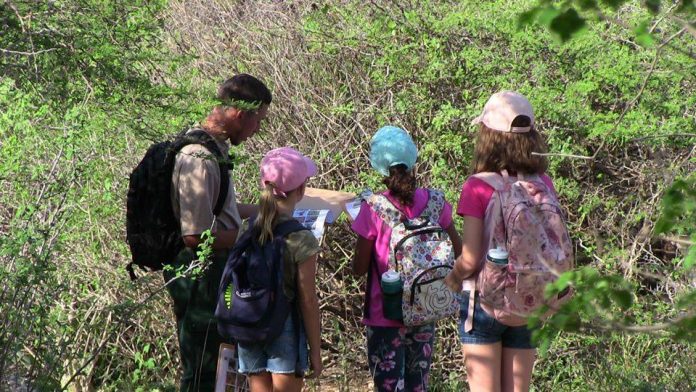Conserving biodiversity is essential: not only because plants and animals have a right to survive, but also because conservation supports the well-being of people. After all, nature is our foundation. Aruba’s national park Arikok organizes their first Conservation Week. Join them and learn how you can be part of nature conservation on Aruba.
Nature calls
The Arikok Aruba National Park is worth the ride. We love the hikes that are guided by the park’s rangers whose job is to maintain trails and protect natural resources. The flora and fauna are beautiful and the historical sites tell you about the island’s indigenous roots. If you are not up to walking, you can drive through the park, one way or another this park is a great place to spend an entire day. Cruising through the landscape you end up at some of the most stunning beaches like Dos Playa or Daimara Beach. In total the park consists of 7907 acres protected nature with a richness of animals living in it. The Aruban whiptail lizard (cododo), Aruban cat eye snake (santanero) and endangered rattle snake (cascabel) are just some of them, you can also admire these close in the park’s Visitors’ Center.
From this Sunday on the park has scheduled some activities to celebrate their first Conservation Week. Check out the program and feel welcome to join.
Sunday July 26
Junior Ranger activity
7am – 10am
Today is International Day for the Conservation of Mangrove Ecosystems. Mangroves are rare, spectacular and prolific ecosystems on the boundary between land and sea. These extra ordinary ecosystems contribute to the wellbeing, food security, and protection of coastal communities worldwide. They support a rich biodiversity and provide a valuable nursery habitat for fish and crustaceans. Mangroves also act as a form of natural coastal defense against storm surges, tsunamis, rising sea levels and erosion. Their soils are highly effective carbon sinks, sequestering vast amounts of carbon. Yet mangroves are disappearing three to five times faster than overall global forest losses, with serious ecological and socio-economic impacts. Current estimates indicate that mangrove coverage has been divided by two in the past 40 years. The International Day for the Conservation of the Mangrove Ecosystem, adopted by the General Conference of UNESCO in 2015 and celebrated each year on 26 July, aims to raise awareness of the importance of mangrove ecosystems as “a unique, special and vulnerable ecosystem” and to promote solutions for their sustainable management, conservation and uses. (Unesco.org)
Tuesday July 28
World Conservation Day is celebrated internationally to create awareness about the best practices how to protect our national resources. Each and every activity in the world depends upon nature so people should understand that any activity they do will affect the earth. Conservation of nature is of utmost importance to all human beings and their life on Earth. Earth has given essential need to live like water, air, trees, animals, food, soil, minerals, etc. so its people duty to keep the environment safe and clean. There are so many threats to nature, such as deforestation, illegal trade in wildlife, pollution, plastics use, chemicals, industrial developments, and many more factors. So, it is important to protect nature and to create a healthy environment for present and future generations. (fresherslive.com)
Wednesday July 29
Conservation quiz on social media.
Thursday July 30
Webinar: Foundation National Park Aruba about nature conservation in practice.
Friday July 31
World Ranger Day: celebrating all the work that rangers do around the world to protect the cultural heritage and natural treasures of the planet. Around the globe, park rangers are on the front line in the fight to protect our natural heritage. World Ranger Day offers a chance to support their vital work, which ranges from environmental campaigning to education. The day is also an opportunity to pay tribute to rangers who have lost their lives in the line of duty. (daysoftheyear.com)
Saturday August 01
Today you may join us on a rough hike. Discover the wild side of our national park during a strenuous guided hike.
More details of the above program will be shared on the park’s social media: Facebook Aruba National Park, website www.arubanationalpark.org.




















